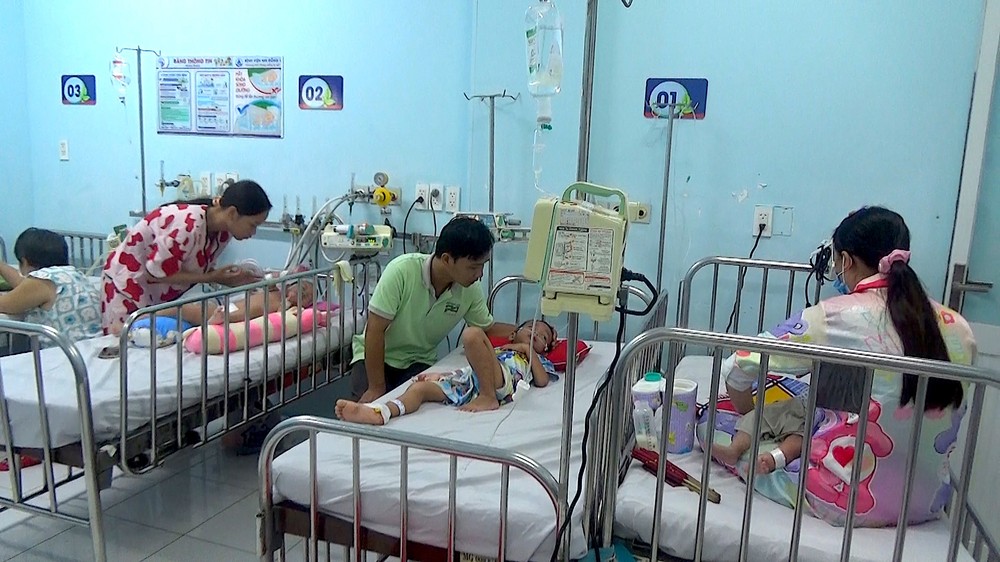
The Department of Infectious Diseases - Neurology at Children's Hospital 1 in Ho Chi Minh City receives 90 percent of its measles patients from other provinces and cities.
The hospital’s Department of Infectious Diseases can be considered a hot spot since the beginning of the measles epidemic season, when it has to strain to receive a large number of cases from Ho Chi Minh City and other localities, with many cases of severe complications.
Presently, the Department receives over inpatients infected with measles daily; therefore, physicians must even work at weekends to satisfy growing demands of treatment and they discharge slight cases who can be monitored at homes to have enough beds to more critical cases.
A significant increase in outpatient treatment, coupled with a delay in discharging hospitalized children, will inevitably lead to severe overcrowding in inpatient wards. Despite nearly two months of vaccination for city children, many children in various provinces remain unvaccinated, warned Dr. Du Tuan Quy, Head of the hospital’s Department of Infectious Diseases and Neurology.
However, not all children with measles require treatment in larges infirmaries in the city. Many cases are transferred to big hospitals in Ho Chi Minh City because parents are too worried. Many epidemiologists are fretting about overloaded hospitals and increased possibility of spreading if all patients are transferred to the southern largest city which is bearing the burden of measles while hospitals in provinces where measles-infected patients are living are completely capable of treating the disease.
According to Dr. Luong Chan Quang, Head of the Department of Disease Control and Prevention in Ho Chi Minh City-based Pasteur Institute, there has been a significant increase in measles cases in 19 southern provinces and cities, with children aged 1-10 being disproportionately affected. Over 50 percent of the cases treated in Ho Chi Minh City have placed a considerable burden on the city's healthcare system. This ongoing outbreak has hindered the city's efforts to reduce measles cases, despite early vaccination campaigns. Dr. Quang asserts that achieving high immunization rates in Ho Chi Minh City is crucial to establishing a safe zone and mitigating the spread of the disease. In October, southern provinces and cities have undertaken measles vaccination campaigns for young children to prevent further transmission.
While Ho Chi Minh City has successfully completed its measles vaccination campaign, administering 223,978 doses, the city continues to experience a significant number of measles cases, exceeding 100 cases per week. The cumulative number of measles cases since the beginning of the year has reached 1,308, with Binh Chanh, Binh Tan, and Thu Duc districts reporting the highest caseloads. Incomplete vaccination records, particularly among migrant children, have been identified as a contributing factor to the outbreak. Nevertheless, timely vaccination campaigns have effectively reduced the risk of a major measles epidemic.
Explaining the surging measles cases, Deputy Director Le Hong Nga of the Ho Chi Minh City Center for Disease Control has attributed the rapid increase to incomplete vaccination records, particularly among migrant children. According to her, many children have not received the full two-dose vaccination series, rendering them susceptible to infection. Nevertheless, timely vaccination campaigns have effectively reduced the risk of a major measles outbreak.
Statistical data from the Ho Chi Minh City Center for Disease Control reveals that approximately 23 percent of cases involve children under the age of 9 months, who are too young to be vaccinated according to the expanded vaccination schedule, and 18 percent involve individuals over the age of 10, who are ineligible for the vaccination campaign.
With determination to end the measles epidemic, the Ho Chi Minh City Department of Health has sent a document to competent authorities asking to include more groups for measles vaccination. Accordingly, authorities in districts continue to review and update information on children in the area and urge their parents to take their children to healthcare centers for vaccination.
Dr. Truong Huu Khanh, Vice President of the city Infectious Diseases Association, emphasized the urgency of vaccinating children against measles in provinces and cities. He warned that a slow vaccination rate could lead to an influx of patients in Ho Chi Minh City, thereby increasing the risk of transmission to unvaccinated groups and children lacking immunity. It is crucial to note that after vaccination, children require a minimum of two weeks to develop immunity, necessitating vigilance and prompt action. Some local hospitals have not established effective isolation measures, resulting in a loss of trust among parents, who then feel compelled to seek care in Ho Chi Minh City. Furthermore, measles is currently spreading rapidly among children residing in workers' dormitories in neighboring provinces, with parents often uninformed about the outbreak. As of October 29, the city Department of Health reported a rise in new measles cases among children under 9 months, particularly those aged 6 to 9 months.
According to the HCMC Center for Disease Control, there have been 315 measles cases in children under 9 months, representing 24 percent of total cases, with 146 requiring respiratory support, including 53 children under 9 months, which accounts for 36.3 percent. Amid increasing incidence of measles in this age group, the city Department of Health has formally recommended measles vaccination for children under 9 months to the Ministry of Health.
Since the beginning of the year, hospitals in HCMC have treated 3,139 measles cases, with 58 percent of these cases originating from other provinces, and there has been one reported death.
























